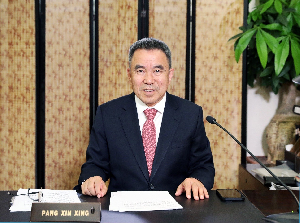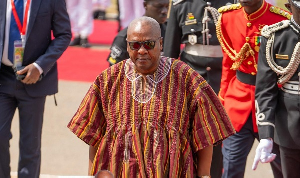On April 20-21, the 5th Harvard Kennedy School China Conference was held at the Harvard Kennedy School. On the evening of the 21st, Pang Xinxing, the Chairman of StarTimes Group, was invited to attend online.
The Harvard Kennedy School China Conference, founded by the Harvard Kennedy Greater China Society, focuses on the development of Chinese and foreign economies, politics, and cultures.
It aims to bridge the communication gap between China and the world, providing a friendly and open platform for discussions among global academia, government, business, and societal leaders. The theme of this conference was "Sincerity and Cooperation," featuring nine sub-forums discussing topics such as "U.S.-China Relations," "Global Macroeconomics and the Chinese Economy," "Global Governance of Artificial Intelligence," "China and Southeast Asia," "China and the Middle East," "China and Africa," "China and Latin America," among others.
The event invited Xie Feng, the Chinese Ambassador to the United States, Graham Allison, the founding Dean of Harvard Kennedy School Graham Allison, Dean Xue Lan of Tsinghua University's Schwarzman College, as well as representatives from the political, business, and academic sectors of both countries, more than 300 Harvard students and faculty members, and over 300 Chinese students studying in the United States. Through communication and collaboration, the conference aimed to find common paths for development.
As the founder of a leading digital TV company in Africa, Pang Xinxing, Chairman of StarTimes Group, delivered an online speech at the sub-forum "China and Africa: Future Prospects," sharing the journey of the founding, growth, and development of StarTimes Group's African business with the participants.
StarTimes Group was founded in 1988 and has a history of 35 years. Since its establishment, it has always been deeply involved in the fields of broadcasting, television, and new media.
Chairman Pang Xinxing introduced: "In China, StarTimes has experienced the entire process of Chinese cable television development, from non-existence to existence, from analog to digital, becoming a system integrator and technology provider with extensive influence in the Chinese radio and television industry." In Africa, starting from obtaining the first digital TV operating license in Rwanda in 2007, after nearly twenty years of operation and development, “StarTimes has established a network transmission platform covering 45 countries and 1.2 billion people in Sub-Saharan Africa.
" It has become the only operator providing paid long video services in English, French, and Portuguese-speaking regions of Africa simultaneously. It has established a mechanism for content generation through program integration, program translation, and program production, currently transmitting 830 sets of mainstream African TV channels, StarTimes' self-operated channels, and international channels on the platform in over ten languages for continuous 24-hour broadcasting. It has established a complete marketing system and after-sales service system, including over 200 outlets and 30,000 convenience stores, and has built a workforce of 4,000 employees."
He stated: "StarTimes has continuously invested in Africa's information industry and made its own contribution to the digitalization and informationization of African society," including breaking industry monopolies, promoting the popularization of digital TV in Africa, significantly lowering the investment and technological barriers for local TV media, promoting the prosperity and development of local African media, organizing competitions for local African language dubbing to select and train local dubbing talent, establishing dubbing bases at the StarTimes headquarters and locally in Africa to promote the inheritance and development of local African culture, and more.
Today, StarTimes has become a well-known outstanding brand in Africa. In the increasingly close cooperation between China and Africa today, StarTimes' operations in Africa are entering a period of harvest.
Chairman Pang Xinxing pointed out, "With the deepening of China-Africa economic and trade cooperation and the increased support for energy infrastructure in Africa by organizations such as the World Bank, electricity in Africa is gradually becoming more prevalent. As it goes, the next decade will certainly be a decade of popularization of digital (smart) household terminals in Africa. We are full of confidence in the development of the African economy!"
Africa News of Monday, 22 April 2024
Source: StarTimes Ghana

















